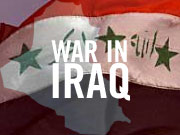Photos
Your Voice
| ||||||||||||||||||||||||
A Minnesota Marine is home and healing
October 15, 2003
 |
| Front: Jorge Alvarado. Back left to right: grandfather Reinaldo Riera, mother Nieves Riera Alvarado, father Vicente Alvarado (MPR photo/Dan Olson) |
Minneapolis, Minn. — Jorge Alvarado and others from his Marine unit were in charge of a military traffic checkpoint in Najaf. Alvarado says a car and a truck driven by Iraqis careened out of control, and the car struck him. "(The crash)sent me flying about 30 feet. I landed on the other side of the road and got dragged by another car," Alvarado says.
Alvarado was knocked unconscious, and he says his knees may have suffered permanent damage, but he asked to be returned to his unit so his fellow Marines wouldn't worry about him.
Alvarado's battalion went into Iraq at the beginning of the U. S. invasion. They were among the American troops who sped through the country securing key sites.
"We were the ones who took over the oil refinery in Basria," Alvarado says. "And we're the Marines that secured the area of the statue where Saddam was pulled down in Baghdad."
Alvarado says at first the Iraqi's he encountered took a wait and see attitude toward the American troops that soon changed into a warm welcome.
"They kind of wanted to see what we were up to," he says. "Once they found out that they were there to help them they like opened their arms up for us."
Alvarado says the Iraqi's warned the Americans about people and places they believed were dangerous.
"They would come to us and tell us things, this place has rocket propelled grenades, these people, this place planning to do this...we'd plan a raid and do it and sometimes it'd be correct and sometimes it wouldn't," he says.
Najaf is 100 miles south of Baghdad. Shi'a Muslims, Iraq's largest Islamic group and the one that suffered greatly under Saddam's regime regard Najaf as the country's holiest city. A car bomb in Najaf in late August killed a Shi'a leader and 120 others.
Alvarado says while in Najaf, the Marines slept on the floor and tables in a college classroom. He says conditions for Iraqi's living in the southern part of the country are difficult.
"In the south you see just skinny people, up north you kind of started seeing people that are fatter. You could see the difference between north and south," he says.
Twenty-one year old Jorge Alvarado is 5 feet 9 inches tall and 175 pounds with Marine recruiting poster good looks and confidence. He recounts his time in Iraq at his parent's south Minneapolis home. He's dressed in fresh blue jeans, hooded sweatshirt and running shoes. The living room walls hold several pictures of him in uniform next to family photos of his younger brother and sister. A Marine Corps and U. S. flag stand in the corner. Outside, there's red, white and blue bunting, more flags and a big welcome home sign over the steps. His return Saturday sparked a party at his parents house that attracted 160 people.
Alvarado says his unit had enough water and food unlike accounts from other U. S. troops complaining of shortages.
Alvarado has no doubts and no regrets about the U. S. invasion of Iraq.
"Just seeing the people and how they welcomed us and treated us you know it kind made me happy, made me feel good that we went out there and did something for a change, and I think I would do it again if they asked me to probably," Alvarado said.
Jorge Alvarado says he has 10 months of Marine duty remaining. After that, he says, he wants to go into law enforcement, get married and start a family. His father and mother stood nearby, beaming, greatly relieved their oldest child is home from the war.
|
News Headlines
|
Related Subjects
|

